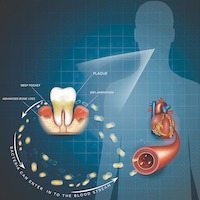Gum Disease and Heart Failure: Is There a Relationship?
October 21st, 2021There’s no doubt that our oral health may be an indicator of what may going on in the rest of our bodies. The research is not conclusive, but more and more studies point to individuals with periodontal (gum) disease experiencing increased risks of cardiovascular issues like heart attack or stroke. One of the theories is that the bacteria from infected gums travels to the bloodstream throughout the body where further inflammation and damage is caused, possibly leading to heart attack, stroke and tiny blood clots.
 Follow-up Study Links Periodontal Disease to Cardiovascular Issues
Follow-up Study Links Periodontal Disease to Cardiovascular Issues
A recent report by the European Society of Cardiology was based on follow-up research to a 2010-2014 Swedish study of 1,587 individuals with the average age of 62. Of this group:
- 985 were classified as “healthy”
- 489 had moderate periodontal (gum) disease
- 133 had periodontitis (severe gum disease)
In the follow-up study conclusion, Dr. Giulia Ferrannini, of the Karolinska Institute in Stockholm, was noted as saying that “The risk of experiencing a cardiovascular event during follow-up was higher in participants with periodontitis, increasing in parallel with the severity. This was particularly apparent in patients who had already experienced a heart attack.”
She added: “It is important to underline that the quality of care in Sweden is high, as confirmed by the overall low number of total events during follow-up. Despite this, gum disease was linked with an elevated likelihood of cardiovascular disease or death.”
Gum Disease Can Lead to Tooth Loss
Gum disease is unfortunately a big issue in this country. In a 2018 National Health and Nutrition Examination survey, an estimated 42% of adults 30 years or older were found to have severe periodontitis (gum disease). When bacteria from plaque is not removed, it becomes tartar, which inflames the gums and can become gingivitis, what we call early periodontal (gum) disease. If not treated, gingivitis can lead to receding gums, dental pockets and even tooth loss.
Reduce Your Risk Now
Gum disease is normally prevented by following these steps:
- Practicing good oral hygiene (brushing twice a day and flossing and cleaning your tongue daily)
- Avoiding smoking/tobacco usage and excessive alcohol use
- Increasing exercise
- Maintaining healthy, balanced diets
- Seeing your dentist and periodontist for regular examinations and professional cleanings
For stubborn cases, even regular brushing and flossing may not be sufficient to remove all calcified plaque (tartar), especially around the gum line. If you’re looking for a practice that offers today’s latest, state-of-the-art techniques for treating gum disease, please contact us today and visit us at one of our two convenient office locations.
